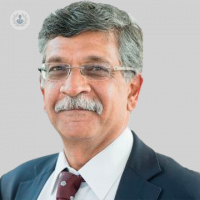What is a neurologist?
A neurologist is a doctor who specialises in neurology which diagnoses and treats diseases of the brain and nervous system. This includes treating conditions of the spinal cord, nerves and associated muscles. A neurologist will treat
neurological conditions, disorders and injuries that affect the nervous system. You can
define neurology as a branch of medicine concerned with studying and treating disorders of the nervous system. The central nervous system comprises the brain and spinal cord, whilst the peripheral nervous system includes sensory receptors such as the eyes, skin and ears.
What does a neurologist do?
Neurologists manage and treat
neurological diseases as well as problems with the nervous system that may be caused by accident and injury. A
paediatric neurologist treats neurological disorders that affect children and infants.
What is a neurological disorder?
Neurological disorders are diseases of the brain, spinal cord and nerves. There are hundreds of different
neurological disorders, but some common neurological conditions include:
How to become a neurologist:
In order to qualify as a specialist in neurology, you first have to complete an undergraduate medical degree. Following this, you must complete two years of foundation training working as a junior doctor on a rotational basis in different departments, including with neurologists. You can proceed to become a neurologist on two different pathways – the clinical pathway or the academic pathway. If you choose the clinical route, after foundation training you will take on your two-year core medical training, followed by neurology clinical training and, usually, further research. If you choose the academic route, foundation training is followed by an academic clinical fellowship and then obtaining an MD or PhD. After this, you take on clinical lecturer training.
When to see a neurologist:
If you are experiencing any of the following
neurological symptoms, you should book an appointment with a neurologist:
What does a neurologist do on your first visit?
At your initial consultation with a neurologist, you will discuss your symptoms and medical history. You may have several
neurology tests to check your speech, mental state, strength, coordination, reflexes and vision, depending on what your symptoms are. A
neurological assessment might also involve a
brain MRI scan, blood and urine samples and a brain function scan (EEG).
How can I make an appointment with a neurologist?
There are a number of ways to book an appointment with a neurologist. You can either visit your GP and receive a referral, or you could ‘
find a neurologist near me’ by searching on Top Doctors where you can make an appointment with a
private neurologist of your choice. Whilst major hospitals have a
neurology department with several consultant neurologists, some are dedicated neurology centres. For example, the
UCL Institute of Neurology and the
National Hospital for Neurology and Neurosurgery are neurology research centres and hospitals, respectively, in London and they are renowned for having some of the best neurologists in Europe.




















